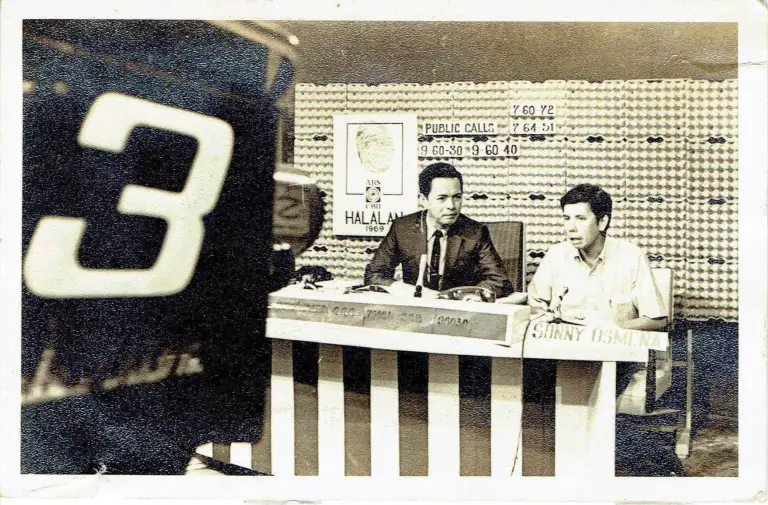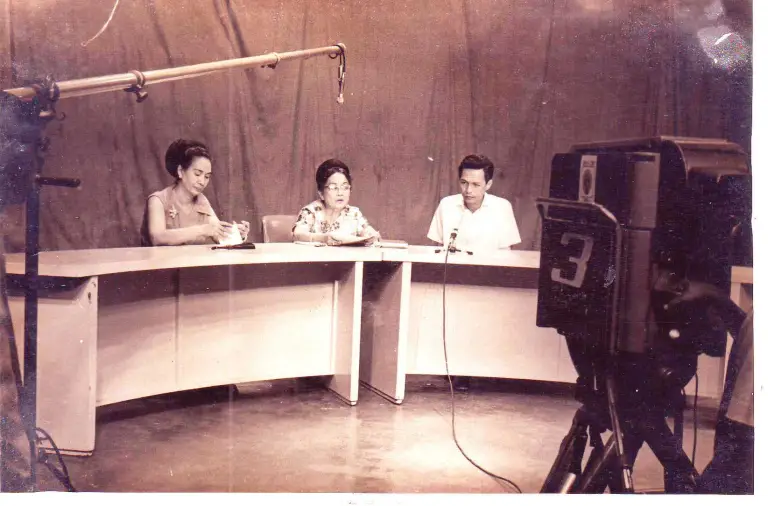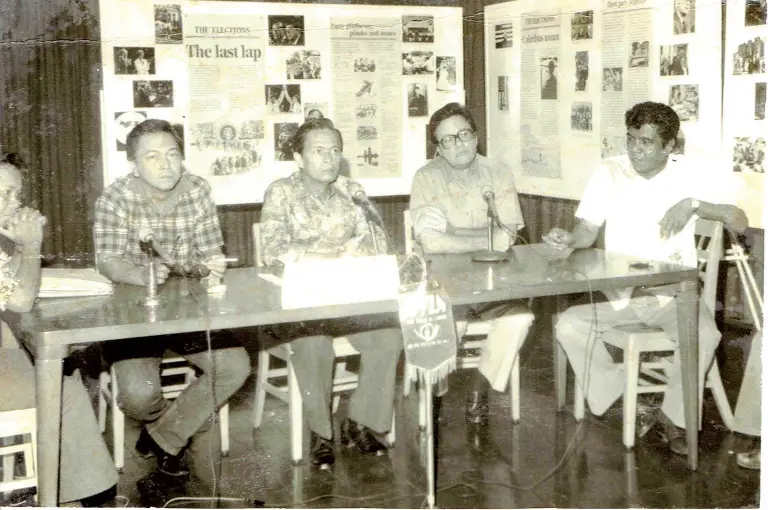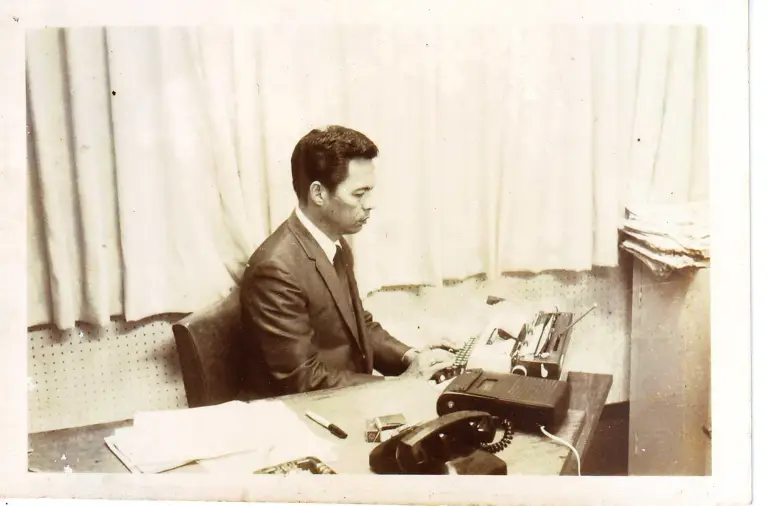Jess Vestil: ‘Renaissance Man’; a journalist plus
Passage

Jess Vestil, then with Channel 3 of ABS-CBN Cebu, interviewing politician John “Sonny” Osmena.
Jess Vestil: ‘Renaissance Man’; a journalist plus
KEVIN A. LAGUNDA
Sept. 2017 ( CJJ12 )
JOURNALIST, publicist, advertising executive—Jess Perez Vestil was all that. Plus teacher, actor and poet besides.
Vestil’s love for his mother language and country gave birth to “Yutang Tabunon,” the Cebuano translation of the Philippine national anthem.
The late multi-talented journalist answered the call of then Cebu Gov. Emilio Osmeña, who sought the Cebuano version of “Lupang Hinirang.”
Jess Vestil’s children, including Jane Sepulveda Vestil Melendez, consider the translation to be their father’s precious contribution to the Cebuano culture.
“He once said that when we, Cebuanos, sing the national anthem in our own tongue, we could feel the anthem better,” Melendez said. “It’s as if the words make us cherish our own ‘nasud’ (nation) because we understand the lyrics to it.”
Vestil, before going to work, turned on the radio for news. He read the papers after breakfast.
A skilled broadcaster himself and a Lubas sa Dagang Bisaya (Ludabi) member, his ears were detectors for incorrect usages.
“He was oftentimes critical of radio anchors who spoke the vernacular in a wrong manner. Since most of those that he listened to were his friends, he would call them by phone and correct them verbatim on their mistakes,” Melendez said. “In a way, my dad was a perfectionist when discussing or writing anything in Cebuano. At home, he would automatically correct anyone he heard when a word was either misspelled or mispronounced.”
Melendez said speaking English in their household was a normal thing, and their father tolerated them.
“When we committed errors in using Cebuano, he would just correct us, and he oftentimes found humor in the words that he taught us,” she said. “He was a very gentle man, not only to our mom but also to us, his children.”
Vestil, who was born in Cebu on July 8, 1929, had nine children—Annabel, Nicolas, Remedios, Jane, Vivian, Raymundo, Gabriel, Victor and Albert—with Pacita.
Vivian took up mass communications at Silliman University, where Vestil was one of the founders of radio dySR.
She, however, took her major subjects at St. Theresa’s College (STC) in Cebu City for advertising and public relations. Vivian’s youngest son, Val, is a mass communication graduate from Silliman.
Vestil’s Catholic faith led him to initiate with then Cebu Archbishop Ricardo Cardinal Vidal the six o’clock prayer aired by radio stations in 1990.
In 1949, Vestil started his young media career at radio dyRC. Years later, he blossomed in acting, print journalism, television, advertising and public relations.
Vestil became the manager and newscaster of ABS-CBN from 1962 to 1972. In the 1960s, Vestil ventured into public relations work for a public official and was appointed assistant director of the publications office of Silliman University, editing the magazine The Banner.

Vestil, joined in a TV interview by Concepcion G. Briones, society writer and former Association of Cebu Journalists president (extreme left).
He was also into advertising with Philasia Advertising Associates. In the early days of Martial Law, he was media consultant of the Philippine Constabulary in Central Visayas. From then on, he became the chief announcer of J. Walter Thompson Advertising Agency and led Notre Dame Broadcasting Corp. as its production manager.
Vestil was also the production manager of dxMS in Cotabato City. He later moved to Dumaguete City to start and manage dyRM.
He taught in STC, University of the Philippines Cebu and Cebu State College.
From 1973 to 1991, he was public affairs specialist of the United States Information Service (USIS) in Cebu.
“I remember Daddy Jess to be very detailed in writing. He would edit and re-edit anything and everything he wrote. Nothing came out from his desk, when he was connected with the USIS, that was not perfect. He was a perfectionist in his writing all the time,” Melendez said.
Vestil dipped his hands into film by writing the screenplay of “Pit Senyor” in 1953 and appearing in at least 22 films produced in Cebu and Manila.

Vestil, in a panel discussion on TV with the late congressman Antonio Cuenco (extreme left) and lawyer-radio commentator Miguel “Migs” Enriquez (extreme right). Photos from Jess Vestil’s family.
Aside from his busy life in various fields, Vestil also dabbled in literature and wrote numerous poems and produced books.
Melendez said her father gave her and her siblings copies of Richard Bach’s novella, “Jonathan Livingston Seagull.”
“He appreciated the writer. He was also a fan of the famous Khalil Gibran,” she said.
Contemporaries considered Vestil a Renaissance man. He received several awards including the Most Valuable Filipino, which was given to him by Filipinas Foundation in 1988.

More than a broadcaster and print media writer, Vestil dabbled in literature, especially poetry.
Vestil died on April 7, 2006 in Cagayan de Oro City due to complications of pneumonia, which ended his years of suffering from Parkinson’s Disease. He was 77. 
